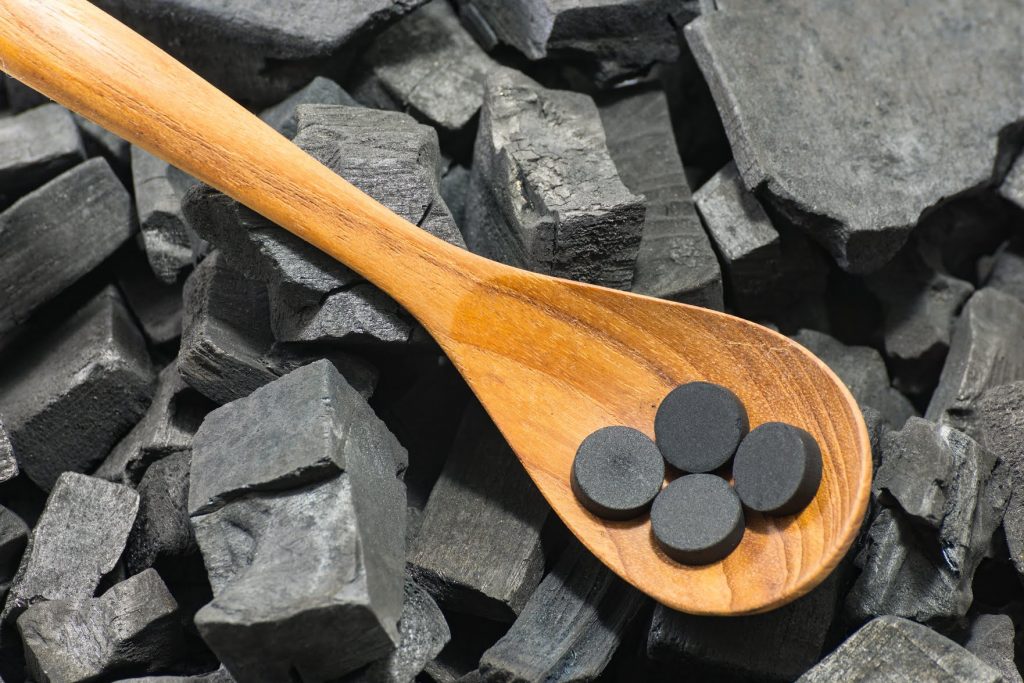Reasons you should (and not) be taking activated charcoal - NOWinSA

From to Gwyneth Paltrow to Kim Kardashian, several celebrities swear by the many wonders activated charcoal can work on their body. Available in a variety of forms, including powder, activated charcoal is commonly taken by mouth to treat acute poisoning.
It is also used for intestinal gas (flatulence), high cholesterol, hangovers, upset stomach, and bile flow problems (cholestasis) during pregnancy, as well as for healing wounds when applied to skin.
Here are the 7 benefits of charcoal as proven by science:
- Treating poisoning / drug overdose
This popular black powder stops toxins from being absorbed in the stomach by binding to them. The body is unable to absorb charcoal, and so the toxins that bind to the charcoal leave the body in the feces. It is most effective when given within one hour of ingestion of the toxin.
How? According to a report by PubMed, activated charcoal adsorbs many noxious substances – medical drugs, phytotoxins and poisonous chemicals – onto its surface, preventing their absorption from the gastrointestinal tract.
As a secondary decontamination mechanism, it interrupts a potential enterohepatic and/or enteroenteric circulation.

2. Treating kidney disease
Although more research is needed, some animal studies have show that activated charcoal may help improve kidney function and reduce gastrointestinal damage and inflammation in those with chronic kidney disease.
One specific study saw rats with induced, chronic kidney disease given 4 grams (g) per kilogram per day of an oral activated charcoal preparation. The researchers found that the animals had significant reductions in intestinal inflammation and damage.
Furthermore a combination of oral activated charcoal plus low protein diet was recommended – in this clinical findings – as an alternative for handling in the old end-stage renal disease patients.
3. Treating gas and bloating
One study found activated charcoal powder is able to disrupt intestinal gas.
How: Liquids and gases trapped in the intestine can easily pass through the millions of tiny holes in activated charcoal, and this process may neutralize them.
4. Water purification
Popular purification brands have long used activated charcoal as a natural water filter. Studies claim that activated charcoal is able to interact with and absorb a range of toxins, drugs, viruses, bacteria, fungus, and chemicals found in water.
As it's the case in this experimental study, which found that water filtration significantly decreases its fluoride concentration, multitudes of water filtration products are also designed for at-home use using carbon cartridges tousing carbon cartridges to purify water of toxins and impurities.
5. Treating diarrhoea
A 2017 review concluded that activated charcoal might be effective in preventing bacteria and drugs that can cause diarrhoea from being absorbed into the body by trapping them on its porous, textured surface.
That said, there are growing concern that it can bind with some medications, including some antidepressants and anti-inflammatory medications, causing them to be less effective. So the rule of thumb is to avoid taking it at the time of your medication – at least 2 hours before or 1 hour after a dose of any other medicine.
6. Treating skin conditions or wounds
Many traditional medicine practitioners have long used activated charcoal powder made from coconut shells to treat various skin conditions such as acne, oily skin and insect bites.

Like wise, previous clinical findings in a 2007 study supported the use of activated charcoal combined with silver in the management of chronic wounds. This dressing may help remove toxins that impair the healing process. It also proved to have antibacterial effect by absorbing harmful microbes from wounds.
7. Teeth whitening
Notwithstanding some experts concern that the abrasiveness of charcoal can actually cause more harm to your teeth than good, renowned New York-based dentist Nicole Khalife is among those who acknowledges some of its potential benefits when it comes to teeth whitening or removing stains. However, she also goes on to elaborate about some of potential risk as explained in this article.
She said that individuals should consider a few things before applying activated charcoal on their teeth, like making sure the powder is extra fine – and not too harsh – so as to prevent enamel loss. She also recommended once a month use, as opposed to daily because of its abrasiveness.
*For the latest must know beauty and health trends in South Africa, make sure to regularly visit the NOWinSA / Beauty Page!
Comments
Post a Comment